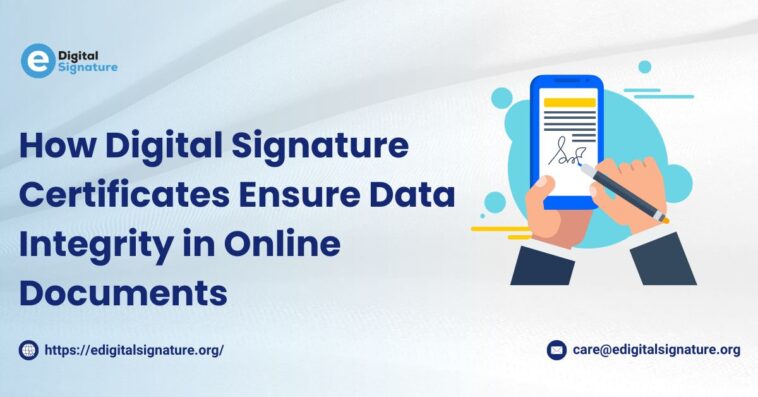How Digital Signature Certificates Ensure Data Integrity in Online Documents
With the increasing reliance on digital transactions and electronic documentation, maintaining the integrity of online documents has become a priority for individuals, businesses, and government organizations. One of the most effective methods to ensure data integrity is through the use of Digital Signature Certificate (DSC). These certificates provide a secure and verifiable way to authenticate documents, ensuring they remain unchanged and unaltered after signing. This article explores how DSCs work, their role in safeguarding data integrity, and their impact on various industries.
Understanding Digital Signature Certificates
A Digital Signature Certificate (DSC) is an electronic credential issued by a trusted Certification Authority (CA) to authenticate the identity of the signer and secure digital documents. It functions as a cryptographic key that enables the recipient to verify the authenticity and integrity of an electronically signed document. DSCs are based on Public Key Infrastructure (PKI), which uses a pair of cryptographic keys—one private and one public—to create and verify digital signatures.
How Digital Signature Certificates Ensure Data Integrity
1. Encryption and Cryptographic Security
DSCs utilize advanced encryption techniques to ensure data security and integrity. When a document is signed using a DSC, a unique hash value is generated from the document’s contents. This hash value is then encrypted with the signer’s private key, creating a digital signature. Any modification to the document after signing will alter the hash value, immediately alerting the recipient to unauthorized changes.
2. Authentication of Signer’s Identity
One of the core functions of a DSC is to authenticate the identity of the signer. Since DSCs are issued by CAs after thorough verification of the applicant’s credentials, they provide a high level of trust and credibility. When a recipient receives a digitally signed document, they can verify the signer’s identity through the public key associated with the DSC, ensuring that the document originates from a legitimate source.
3. Tamper Detection and Prevention
Digital signatures are uniquely linked to both the signer and the document. If any changes are made to a digitally signed document after signing, the signature becomes invalid, preventing any unauthorized alterations. This tamper-proof feature is essential in legal, financial, and regulatory documents where data integrity is paramount.
4. Timestamping for Enhanced Security
Many DSCs incorporate timestamping, which records the exact time and date when the document was signed. This ensures that the document existed in a specific form at a certain time, making it useful in legal proceedings and compliance scenarios. Timestamping also prevents signers from repudiating their signatures, further strengthening the reliability of digital documents.
5. Non-repudiation and Legal Validity
Non-repudiation is a key feature of DSCs, meaning that the signer cannot deny signing the document. Since DSCs are issued after rigorous verification and use strong cryptographic mechanisms, they hold legal weight in many jurisdictions worldwide. This legal recognition makes DSCs invaluable for contracts, business agreements, tax filings, and other official documents.
Steps to Apply for Digital Signature Certificate
Step 1: Visit Our Website
Go to our website to start the process.
Step 2: Fill in Your Details
-
User Type: Choose if you are an individual or an organization.
-
Certificate Type: Pick if you need it just for signing documents or for both signing and encryption.
-
Validity: Choose how long you want the certificate to last.
-
Personal Info: Enter your name, phone number, email, and address.
-
Agree to Terms: Check the box to agree to the terms.
-
Submit: Click the submit button.
Step 3: Choose Token Option
-
Already Have a Token?: If you have a USB token, choose “No.” If you need a new one, choose “Yes.”
Step 4: Make Payment
-
Payment: Enter your payment details and choose how you want to pay (net banking, credit card, debit card, or UPI).
Step 5: Complete the Process
-
Review: Make sure all your information is correct.
-
Submit: Click submit and wait for a confirmation email.
Step 6: Get Your Digital Signature
You’ll receive your digital signature on a USB token drive after processing.
Applications of Digital Signature Certificates Across Industries
1. Legal and Compliance Documents
Law firms, courts, and regulatory bodies rely on DSCs to authenticate contracts, affidavits, and other legal documents. The ability to verify the identity of signers and ensure the unaltered state of documents is crucial for upholding legal integrity.
2. Financial Transactions and Banking
Banks and financial institutions use DSCs to secure online transactions, loan agreements, and account-related documents. Digital signatures prevent fraud and ensure that sensitive financial data remains intact during transmission.
3. Government and E-Governance Services
Governments worldwide implement DSCs for various e-governance applications, such as tax filings, business registrations, and official notifications. By digitally signing documents, authorities ensure that citizens receive authentic and tamper-proof information.
4. Healthcare and Medical Records
Healthcare providers use DSCs to secure patient records, prescriptions, and medical reports. Digital signatures help maintain the confidentiality and integrity of sensitive health data, ensuring compliance with regulations like HIPAA.
Benefits of Using Digital Signature Certificates
1. Enhanced Security
DSCs offer robust security features, including encryption, authentication, and tamper detection, making them superior to traditional signatures.
2. Increased Efficiency and Cost Savings
Digitally signed documents reduce paperwork, eliminate printing and courier expenses, and streamline document processing.
3. Environmental Benefits
By eliminating the need for physical documentation, DSCs contribute to environmental sustainability by reducing paper consumption.
4. Global Accessibility and Remote Signing
DSCs enable secure document signing from anywhere in the world, supporting remote work, cross-border transactions, and online business operations.
Also read:- Class 3 Digital Signature
Conclusion
Digital Signature Certificates are a cornerstone of modern cybersecurity, ensuring the integrity, authenticity, and confidentiality of online documents. By leveraging encryption, authentication, and non-repudiation, DSCs provide a secure and efficient way to sign and validate digital documents. As businesses and governments continue to adopt digital transformation, the role of DSCs will become even more critical in safeguarding data integrity and promoting trust in digital transactions.
This post was created with our nice and easy submission form. Create your post!





